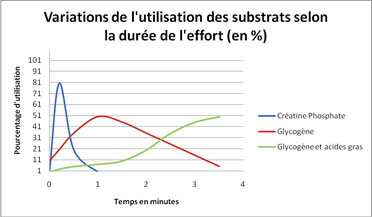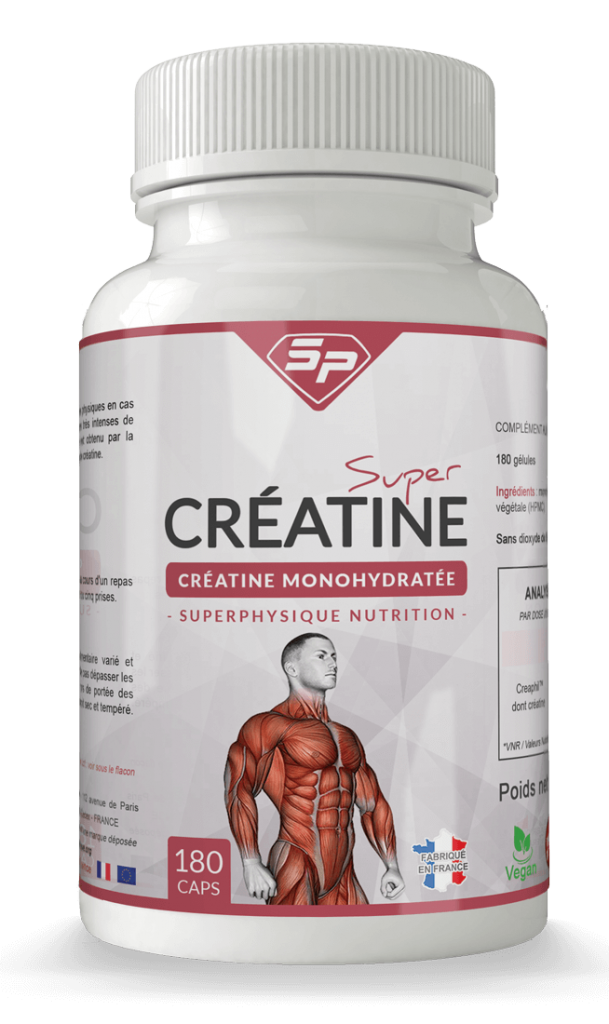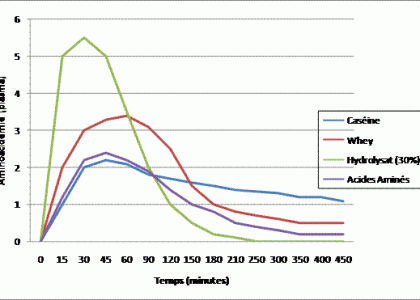Creatine is one of the top-selling bodybuilding supplements. It is also likely the supplement that has benefited from the most medical research. But is this popularity justified? Is this a significant addition or a hoax? What are the indications, how to use, side effects? Which creatine should you choose? There are so many questions that we would like to clarify once and for all by making data, sometimes technical, available to everyone.
Creatine, ATP & Creatine Phosphate
When you exercise, you contract muscles. This reduction requires energy. This energy is called ATP (adenosine triphosphate). It is made from various substrates found in our body. These are, respectively: fatty acids, glucose and creatine phosphate. Fatty acids come from body fat, glucose from muscle glycogen, and creatine is synthesized in our body from proteins in food or comes directly in small amounts from food. Indeed, meat, and especially red meat, contains creatine. It is also found in fish. But the total remains very low, as 250 g of red meat yields about 1 g. The use of one or more substrates for energy supply depends on the type of effort and its duration. Here is a summary diagram to make it easy to represent each energy sector and use of each substrate:

This graph, also called the Volkov curve, can vary considerably from author to author, but its general appearance remains unchanged. We can have many consequences for athletes in general, as well as the role and use of creatine.
The first thing to know is that there is a link between energy substrate availability and performance and fatigue. Thus, it has been common in recent decades for endurance athletes to overload their muscles with glycogen by replenishing carbohydrates. This method increases glycogen stores by up to 20%, which increases productivity.
This idea can be applied to creatine stores. Indeed, studies have shown that creatine supplementation effectively increases creatine phosphate levels by up to 30%. The immediate consequence is an increase in the ability to perform powerful and short-term efforts: usually strength training, sprint training, or interval training. But also repeat this by promoting ATP renewal. Which means: more reps, from the first to the last set.
Short-term effects of creatine on muscles
Three amino acids are used in the synthesis of creatine. This is a “demanding” response for our body compared to other more important functions. So when you’re tired, on a diet, or sick, your ability to synthesize creatine is reduced. Active athletic players (bodybuilding or endurance) often deplete muscle creatine levels. In contrast, strength training alone, combined with adequate rest and adequate nutrition, will increase muscle creatine levels even without supplementation.
Also, when you are doing traumatic workouts for your muscles, muscle fiber damage is not seen as a primary goal of our body’s recovery: it is important to take care of energy stores. This is very well explained in terms of survival: if you are in the wild in a situation that forces you to use all your energy to flee, what is the priority? This means continuing to provide yourself with energy, not regenerating muscle fibers to make them fat. But today, that time has passed, except when your mother-in-law is following you. So the solution is to re-energize the cell as quickly as possible or make it believe that it is. Once this step is taken, protein synthesis is accelerated.
This role can be played by creatine. This property accelerates the accumulation of glycogen and also accelerates the activation of muscle fiber repair, signaling the muscle cell that energy is being renewed. Therefore, recovery is faster. This effect also occurs naturally without additives. The add-on just makes things faster.
In addition to this effect, creatine has the ability to increase muscle strength (but not all, as described below). This increase depends on the type of effort and each of them, but according to the researchers, it ranges from 5 to 15%. This increase can occur in a relatively short period of time, which means that the cause is not an increase in muscle mass. An in-depth analysis of research on this issue does not reveal any mechanism known for certain. However, the interaction with the calcium pump of cells seems to be the most probable. This is how creatine has shown the ability to accelerate muscle relaxation after contraction. This time saving allows the next reduction to be strengthened. This mechanism is likely involved in other metabolic effects of creatine, especially in the brain.
An increase in strength is almost always accompanied by an increase in body weight. This initial increase is associated only with water retention in the intracellular environment, and not with an increase in muscle mass. Thus, you have lost all the benefits that you saw! Creatine will not be used free of charge?
Be sure creatine is very effective, but in order to measure its effectiveness, it is necessary to distinguish between its rapid effects on the one hand and its long-term effects. What happens when you continue to take creatine?

Super Creatine: Creatine Monohydrate Capsules
Long-term effects of creatine on muscle
When the creatine intake is extended, two things will happen: the increase in strength will allow you to train with heavier weights, and also to do more reps with less rest time. On average, but especially in the long term, this will lead to increased muscle mass.
Currently, other identified effects of creatine are:
- Increased production of local anabolic hormone IGF-1
- Increased production of MGF (mechanical growth factor), another anabolic hormone
- Increased muscle glycogen synthesis
- Increase the activity of muscle satellite cells (whose role is to restore and grow muscle fibers)
- Reduction of catabolism (there is a decrease in leucine oxidation)
- Decreased levels of myostatin, a high activity protein that blocks muscle development
The last effect to consider is an increase in the level of DHT in the body, a hormone derived from testosterone. This finding has been reached in only one study and has yet to be confirmed.
These various effects will appear when creatine is combined with physical fitness. This is how creatine will provide faster recovery and increased muscle mass. When the supplement is maintained long enough, muscle gains will appear much later than the gains associated with water retention.
Various studies have been conducted to estimate that creatine can bring muscle gains of the order of 1 kg per month maximum for a beginner. Quantifying benefits is not possible due to many variables: diet, age, years of exercise, … but the largest analysis to date shows that over 70% of studies done on creatine are positive, 20% negative, and 10% neutral. … Therefore, there is no longer any ambiguity at this point: creatine is an effective dietary supplement in strength sports.
Other benefits of creatine
Creatine may have a number of overall health benefits. Preliminary research has shown that it can lower triglycerides, lipids that circulate in the blood and are a marker of cardiovascular risk. Creatine may also reduce another marker of heart health: homocysteine. However, this effect was not observed in all studies. At the moment, the research is too weak to conclude with any certainty about these alleged effects.
Creatine has been studied in a group of diseases called muscular dystrophies. These genetic diseases form a group of several dozen different types that have the characteristic of weakening the muscles in the body, which ultimately leads to muscle wasting. The largest review of research on this issue was conducted by Cochrane, a renowned research organization known for the quality of its analyzes. The results show that creatine is effective for most dystrophies, which can lead to muscle gains of up to 8%, at least in the short to medium term.
Parkinson’s disease also affects muscle function, resulting in loss of muscle mass, loss of strength, and increased fatigue. Several studies were able to show that creatine was effective for these symptoms in particular, but did not slow the progression of the disease.
Several researchers have also found that creatine has a beneficial effect on bone mass in an exercise program. If the results are clear in the rat, there is still insufficient data to draw a conclusion about humans.
The more interesting aspect of creatine is its effect on cognitive function and concentration. Indeed, it seems to be able to improve intellectual performance in most cases: whether it is short or long term memory tests, IQ tests, spatial orientation … However, some studies suggest that this benefit is zero in young people. More research is still needed to reach a final conclusion.
One last promising point concerns its impact on the treatment of certain mental illnesses. Indeed, thanks to magnetic resonance imaging, researchers have found that energy metabolism in the brain is impaired in certain conditions, such as depression, bipolar disorder, or schizophrenia. Therefore, several studies have examined the effects of creatine in these three conditions. In the case of depression, the results seem to be overtly positive: creatine can reduce symptoms of depression, especially when added to drug therapy if it is persistent depression. In the case of schizophrenia, on the other hand, the results are negative and show no greater benefit than a placebo. In the context of bipolar disorder, the results are important: creatine has clear antidepressant activity and can cause a manic turn, that is, make the disease worse. Therefore, we strongly advise against taking creatine in this case.

Myths and Reality
A careful study of the pharmacological data and studies conducted on the effects of creatine allows us to answer all possible questions. Here are the most important ones to remember:
- Myth 1: Creatine should be taken in cycles
Fact: As explained above, cycling reduces the benefits of creatine because you don’t do it long enough to gain muscle, not just temporary water. Please note that you will not find the same information on your creatine banks because French law requires sellers to register for no more than 4 weeks of supplementation at a rate of 3 grams per day.
- Myth 2: Creatine should be taken with a loading phase followed by a maintenance phase
Fact: This old idea came from a researcher who didn’t have enough time to measure on creatine-taking subjects. So he thought about giving them a mega daily dose to save time. Later studies showed that this protocol was not adequate (see below).
- Myth 3. Take a large dose of creatine
Fact: Creatine is not a doping product. The higher dose is not more effective. In addition, high-dose creatine supplementation slows down and then stops our body’s natural production (which resumes when it stops). A dose of 3 to 5 g per day is sufficient.
- Myth 4: Take creatine once a day
Fact: It’s great for losing money and losing creatine. After all, the effectiveness of creatine depends on its retention in our muscles. A large single dose does not allow muscles to capture enough in such a short time, in part because creatine has a half-life of three hours. Therefore, most of them are found in the blood and then in the urine.
- Myth 5: Creatine is poorly absorbed
Fact: Research shows that creatine is 100% absorbed by humans and is perfectly resistant to stomach acid. Therefore, I will let you decide what to think of the product that is being sold to you under the pretext of better assimilation. What should be maximized with creatine is not uptake, but retention. To maximize latency, here’s what to do: split up as much as possible throughout the day, always take creatine with a meal or snack that is both carbohydrate and protein (at least protein only), and do heavy weight strength training.
- Myth 6: Creatine is only good for weight gain
Reality: The opposite is true: when you gain weight, you bring in a lot of nutrients for creatine synthesis. When you are on a diet, nutrients are lacking (which is why you are losing weight) and creatine synthesis slows down. So you need the most creatine on your diet. However, keep in mind that creatine supplementation offers benefits even if our baseline level is normal. Therefore, the benefits of creatine in the diet will be greater than in weight gain.
- Myth 7: Vegetarians need more creatine
Reality: It’s true. Studies have shown that vegetarians have lower creatine levels than omnivores. Therefore, taking supplements can sometimes be even more beneficial for these people.
- Myth 8: I don’t respond to creatine (no strength gains or reps)
Fact: Some people respond less well to creatine than others. Women react worse than men. Beginners respond worse than advanced people. Hardy people react worse than explosive people (muscularly speaking). If you feel you are not responding to creatine in one of these categories or not: make sure you have used your creatine as described above for at least a month.
- Myth 9: Don’t take coffee or caffeine with creatine
Reality: This idea comes from a 1996 study by Belgian researchers. They then showed that adding creatine and caffeine for 6 days did not improve muscle strength, unlike creatine alone. Later in 1998, Finnish researchers showed that caffeine and creatine interact in opposite ways in terms of muscle relaxation time. A recent study showed that caffeine did not adversely affect creatine in trained subjects. The doses used in these studies were always around 350 mg, or 3 to 4 cups of coffee.
When negative effects are observed, it is only in one dimension: strength secondary to short loading of creatine. This last point shows that creatine and caffeine interact at the level of the calcium pump that regulates contraction (see above). The main effects of creatine, which only appear after a few weeks of supplementation, cannot be blocked by caffeine.
In conclusion, you can drink your coffee with peace of mind.
- Myth 10: Creatine works immediately
Fact: It takes at least a week to feel the difference in muscle contraction. Allow three weeks on average. It will take at least a month to get all the benefits.
- Myth 11. My creatine is better than creatine monohydrate
Reality: There is only one creatine that has been unanimously shown to be effective, and for decades it has been creatine monohydrate. However, it can be more or less refined. Waste from creatine synthesis is potentially toxic, so be sure to buy a quality product. For example, the Créapure label is very well known for its reliability and guarantees high product purity.
- Myth 12. Creatine Ethyl Ester Is Better Than Others
Fact: As explained above, there is currently no substitute for creatine monohydrate. Several studies have shown that creatine ethyl ester is unstable in an acidic environment and in the stomach, and that it rapidly degrades to creatinine, which is an unnecessary residue. A harmful effect on the kidneys is possible. In addition, American researchers have shown that this form of creatine is far less effective than monohydrate for building strength, increasing muscle mass, or maintaining muscle.
- Myth 13: Creatine is a doping product
Fact: Creatine has never been considered a doping product in France since its inception as a dietary supplement. The doping product is included in the list of prohibited products such as the World Anti-Doping Agency. Creatine is not on any of these lists. Its status is the same as that of vitamin C.
Some international media and athletes have long used the term creatine after various trials or public affairs to minimize exposure to the general public. for a good workout we recommend Boldenone As a result, many people believed that creatine was a doping product. If an athlete tests positive for a doping test and tells you that it is creatine, then he is either a liar or someone who was doped without the knowledge of his own will
- Myth 14: Creatine Dehydrates
Fact: All research is formal: even in extreme heat, creatine has no negative effect on hydration. It doesn’t dehydrate and you don’t need to drink any more while taking creatine.

- Myth 15: Creatine is harmful to the kidneys
Fact: Creatine supplementation increases creatinine levels. However, this increase is isolated and does not affect renal function. In any case, this is the conclusion the researchers came to after analyzing all the available data, looking back several decades. However, in very rare cases, the combination of creatine with certain drugs can be harmful to the kidneys, but worldwide, only two cases have been observed since creatine use (see the section on side effects). ). Thus, there is no reason to drink more water while taking creatine.
- Myth 16: Creatine is carcinogenic
Fact: In January 2001, the AFSSA (French Food Safety Agency) reported in a press release that creatine may be carcinogenic. This information was immediately taken up by all the media, which helped shape the current opinion that people have this dietary supplement. Following this, science journalist Thierry Sukkar of LaNutrition.fr researches world-renowned researchers who are working on creatine around the world. The conclusion is clear: there is no evidence that creatine is carcinogenic. What’s worse: it can have anti-cancer effects! He also notes that AFSSA did not contact any of these researchers when writing its report, which preferred a sports physician who never addressed the issue. All researchers interviewed also strongly criticized this report. In conclusion, there is still no evidence or suspicion of a potentially carcinogenic effect of creatine.
Side effects of creatine
Warning. In this section, we will only discuss the side effects of creatine monohydrate. Other forms of creatine, known or unknown, may be dangerous and / or have other side effects that we may not be aware of.
Creatine side effects spilled a lot of ink. But more often on the Internet than during real scientific research. Indeed, all studies show that creatine has virtually no side effects in healthy people. Specifically: Creatine does not dehydrate, does not adversely affect the liver or kidney, does not adversely affect any known marker of health, and makes you fat (gaining muscle and water) .These results were obtained from numerous studies conducted in the short term (several days ), medium-term (several months) and long-term (more than five years).
However, analysis of the data shows that some side effects may be possible in a minority of people: cramps (not associated with hydration), headaches, bloating (especially in the context of too high doses). Anecdotally: increased blood pressure.
There is a very small risk of hypoglycemia with creatine. To avoid negative effects on your workout, it may be a good idea not to take it with food before meals. Please note that this effect mainly affects advanced people.
Finally, creatine can increase creatinine levels. This increase has been shown to be normal and not harmful to the kidney. When in doubt, your doctor will do other tests to assess your kidney function.
Contraindications to creatine
Relative contraindications (doctor’s consultation required):
- People with kidney problems
- People with liver problems
- People being treated for depression
- People with high blood pressure
Absolute contraindications (the use of creatine is highly discouraged):
- People with bipolar disorder
- People with schizoaffective disorder
- People who have experienced a brief psychotic state during their lifetime (also called an acute psychotic state or acute delirium)
- People receiving treatment with cyclosporine, trimethoprim, cimetidine, amikacin, gentamicin, tobramycin, or probenecid
- Pregnant or breastfeeding women
Conclusion
Here is a summary of the practical takeaways to apply when taking creatine:
- Use 3 to 5 g per day (3 g for a beginner and up to 5 g for an experienced professional or someone who has already used creatine with no apparent benefit)
- You can take a little less if you are not exercising (about 2 g if you take 3 g at the usual time, and about 3 g if you take 5 g at the usual time). The sole purpose of this advice is to prolong the life of creatine.
- Spread out catches as much as possible throughout the day (e.g. 1 g with each meal)
- Take it with a meal with a glass of water
- Use only creatine monohydrate
- Do not ride a bike





